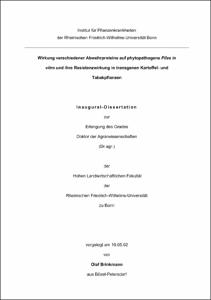Wirkung verschiedener Abwehrproteine auf phytopathogene Pilze in vitro und ihre Resistenzwirkung in transgenen Kartoffel- und Tabakpflanzen

Wirkung verschiedener Abwehrproteine auf phytopathogene Pilze in vitro und ihre Resistenzwirkung in transgenen Kartoffel- und Tabakpflanzen

| dc.contributor.advisor | Dehne, Heinz-Wilhelm | |
| dc.contributor.author | Brinkmann, Olaf | |
| dc.date.accessioned | 2020-04-05T15:24:53Z | |
| dc.date.available | 2020-04-05T15:24:53Z | |
| dc.date.issued | 2004 | |
| dc.identifier.uri | https://hdl.handle.net/20.500.11811/1769 | |
| dc.description.abstract | Die Entwicklung von Transformations- und Klonierungstechniken eröffnet neue Wege in der Züchtung von Kulturpflanzen. Durch diese Verfahren wird es möglich, Gene aus verschiedenen Organismen in Pflanzen zu exprimieren. Ziel der molekularen Pflanzenzüchtung ist die Verbesserung von Qualitätsfaktoren der Kultursorten und die Erhöhung der Krankheitsresistenz insbesondere gegen phytopathogene Pilze. Durch die Übertragung von Fremdgenen, die für Abwehrproteine codieren, kann die Basisresistenz von Pflanzen verändert werden. In dieser Arbeit wurden transgene Kartoffel- und Tabakpflanzen, die die Abwehrproteine Glukanase, Chitinase, RIP oder Kombinationen dieser Proteine exprimierten, mit Hilfe eines Blattscheibentests auf ihre Anfälligkeit gegen wichtige phytopathogene Pilze untersucht. Die Expression von Glukanase und Chitinase in Tabak führte zu einem signifikant verringerten Befall mit den Pathogenen Botrytis cinerea und Phytophthora nicotianae. Durch die Kombination dieser beiden Abwehrproteine konnte im Vergleich zu Einzelkonstrukten nur eine geringfügig erweiterte Erhöhung der quantitativen Resistenz festgestellt werden. Auch die Kombinationen Glukanase/Chitinase, Glukanase/RIP und RIP/Chitinase in Kartoffelpflanzen der Sorte Désirée führte zu einer deutlich verringerten Anfälligkeit gegen Phytophthora infestans, aber nicht zu einer Erhöhung der Resistenz, die über die Wirkung eines einzelnen Resistenzproteins hinausging. Für das T4-Lysozym war bislang nur eine bakterizide Wirkung bekannt. Anhand von in vitro-Untersuchungen konnte eine hemmende Wirkung auf keimende Sporen phytopathogener Pilze festgestellt werden. Auch enzymatisch inaktives Lysozym und die Peptide A4 und A23 des T4-Lysozyms wiesen die gleiche Wirkung auf keimende Pilzsporen auf. Dieser Effekt kann wahrscheinlich auf die Wirkung amphipathischer Helices auf Zellmembranen zurückgeführt werden. Mit Hilfe eines Fluoreszenztests konnte die membranschädigende Wirkung des T4-Lysozyms auf Pilzsporen nachgewiesen werden. Die Expression des T4-Lysozyms in der Kartoffelsorte Désirée unter Kontrolle des konstitutiven 35S-Promotors führte zu einer signifikanten Befallsverringerung nach Inokulation mit Phytophthora infestans. Bei Expression des Proteins unter der Kontrolle des induzierbaren Mannopinsynthase-Promotors konnte jedoch kein signifikanter Effekt festgestellt werden. Transgene T4-Lysozym exprimierende Linien der Kartoffelsorten Panda und Secura, die eine hohe bzw. niedrige natürliche Resistenz gegen P. infestans besitzen, zeigten ebenfalls deutlich verringerten Befall mit diesem Erreger. | en |
| dc.description.abstract | Effect of several resistance proteins on phytopathogenic fungi in vitro and the resistance effect of these proteins in transgenic potato and tobacco plants The development of plant transformation and cloning techniques has opened new possibilities in plant breeding research. With these new techniques now it is possible to transfer genes from different organisms into plants. The objectives of molecular plant breeding are to optimise crop quality and to increase the disease resistance of plants to phytopathogenic fungi. Especially, the basic resistance of plants can be improved by the transfer of foreign genes coding for pathogenesis related proteins. In this paper transgenic potato and tobacco plants expressing the PR-proteins glucanase, chitinase, RIP, or a combination of two of these proteins, respectively, were studied for their resistance to several fungal plant diseases using a leaf disc assay. Tobacco lines expressing glucanase or chitinase, resp., showed significantly reduced infection with the pathogens Botrytis cinerea and Phytophthora nicotianae. In comparison to these lines, the combination of the two PR-proteins led only to a slight further enhancement of resistance of tobacco plants. Furthermore, the co-expression of glucanase/chitinase, glucanase/RIP or RIP/chitinase, resp., in the potato variety Désirée resulted in significantly reduced disease symptoms after infection with Phytophthora infestans but not to a resistance increase higher than the resistance of lines expressing only one foreign protein. The lysozyme of the T4 bacteriophage is known to be bactericidal. Using in vitro assays, an inhibitory effect on germinating spores of phytopathogenic fungi was detected in this work. The same effect was shown for enzymatic inactive T4-lysozyme and for the synthesised peptides A4 and A23 of the C-terminus of T4-lysozyme. Thus, the fungistatic effect is likely ascribed to the membrane disturbing activity of amphipathic helices these peptides are coding for. Using a fluorescence test the membrane disturbing activity of T4-lysozyme on fungal spores could be proven. The expression of T4-lysozyme in potato plants (var. Désirée) under control of the 35S-promoter confers significantly increased resistance to Phytophthora infestans. Whereas potato plants expressing the T4-lysozyme gene under control of the mannopine-synthase promoter showed no significant Phytophthora resistance. Further resistance tests indicate that transgenic T4-lysozyme expressing potato lines of the varieties Panda and Secura, which have high or low natural resistance to Phytophthora leaf blight, resp., show significant enhanced resistance, too. | en |
| dc.language.iso | deu | |
| dc.rights | In Copyright | |
| dc.rights.uri | http://rightsstatements.org/vocab/InC/1.0/ | |
| dc.subject | transgene Pflanzen | |
| dc.subject | T4-Lycozum | |
| dc.subject | Chitanase | |
| dc.subject | Glucanase | |
| dc.subject | Phytophthora infestans | |
| dc.subject.ddc | 570 Biowissenschaften, Biologie | |
| dc.title | Wirkung verschiedener Abwehrproteine auf phytopathogene Pilze in vitro und ihre Resistenzwirkung in transgenen Kartoffel- und Tabakpflanzen | |
| dc.type | Dissertation oder Habilitation | |
| dc.publisher.name | Universitäts- und Landesbibliothek Bonn | |
| dc.publisher.location | Bonn | |
| dc.rights.accessRights | openAccess | |
| dc.identifier.urn | https://nbn-resolving.org/urn:nbn:de:hbz:5N-03716 | |
| ulbbn.pubtype | Erstveröffentlichung | |
| ulbbnediss.affiliation.name | Rheinische Friedrich-Wilhelms-Universität Bonn | |
| ulbbnediss.affiliation.location | Bonn | |
| ulbbnediss.thesis.level | Dissertation | |
| ulbbnediss.dissID | 371 | |
| ulbbnediss.date.accepted | 27.06.2003 | |
| ulbbnediss.fakultaet | Landwirtschaftliche Fakultät | |
| dc.contributor.coReferee | Léon, Jens |
Dateien zu dieser Ressource
Das Dokument erscheint in:
-
E-Dissertationen (1105)




